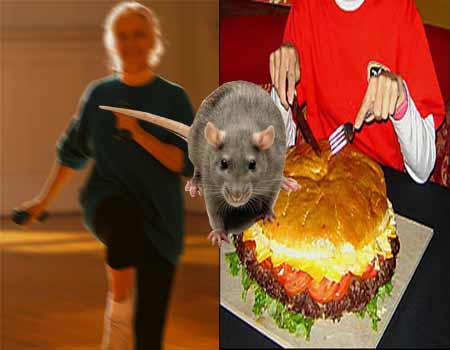Some eat to live, while some control their health by exercising. Its time to control both these activities if one wants to live a healthier and longer life.
Mice allowed to eat as much as they wanted had higher insulin levels, regardless of whether they exercised. That is, how much the mice ate determined their insulin level, while exercise did not have much effect. High insulin levels are associated with a risk of diabetes.
A recent study conducted on mice determined that a low calorie diet increased the longevity of the rodent’s life. Reasons for this are the hormonal changes taking place when mice eat less. And mice don’t go gymming after all!
“We know that being lean rather than obese is protective from many diseases, but key rodent studies tell us that being lean from eating less, as opposed to exercising more, has greater benefit for living longer. This study was designed to understand better why that is,†said Derek M. Huffman, the study’s lead author, from University of Alabama.
The study is applicable strictly to rodents as of now since there are some key differences between the mouse and human physiology warned Huffman. However, to verify whether the findings are applicable to humans or not, two studies were conducted where in people who performed high-volume exercises and people who regulated their diet by taking low-calorie foods were compared. The results are positive, confirming that taking a low-calorie diet definitely has some positive effects which even exercising does not have.
“I wouldn’t say this study has direct implications for people right now. But it shows what physiological changes caloric restriction and exercise produce. We can continue to build upon these findings until we can get a better understanding of how this works in people,†notes Huffman.
There are two main reasons that explain why eating less is beneficial than exercising. Researchers note that exercising stresses the body muscles and this may result in damaging body tissues. Eating less does not do any harm instead it results in beneficial physiological changes in the body. Both the activities have a significant effect on 8-hydroxyguanosine (8-OHdG), a DNA. Exercising lowers the level of 8-OHdG which signifies DNA damage. This damage increases with age. Obesity is another factor causing the DNA damage as seen in the rodents. The rodents that ate whatever they wanted had higher levels of 8-OHdG than the rodents which were made to exercise. So the safest option is to stay out of exercising and have a low-calorie diet.
According to the study:
In humans, such studies are a bit difficult to be carried out as most of the participants complain of feeling hungry, cold and lethargic. However, the researchers note that the exercises help humans avoid cardiovascular diseases unlike mice who are less prone to develop the disease.

